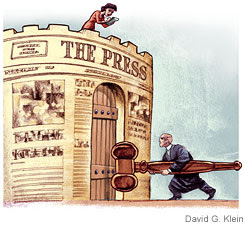 Reporter's Privilege is a tricky topic. There is much controversy surrounding the idea and what liberties are given to reporters. For reporters, this privilege is a monumental benefit and crucial for retrieving viable information from nefarious sources; on the other hand, this creates an issue in the courts on how much power journalists have. Should they be allowed these liberties and does this get into an issue of transparency?
Reporter's Privilege is a tricky topic. There is much controversy surrounding the idea and what liberties are given to reporters. For reporters, this privilege is a monumental benefit and crucial for retrieving viable information from nefarious sources; on the other hand, this creates an issue in the courts on how much power journalists have. Should they be allowed these liberties and does this get into an issue of transparency?Under the First Amendment, reporters are protected in court. They do not have to give up who or where they got a source for information. The idea of this is to ensure that the parties involved, who gave them the information, are protected. They feel secure in that their confidentiality is protected by law. Journalist reserve the right to withhold sourcing information.
How much liberty is given to journalists goes deeper. As with most laws, the states themselves act upon them as well. Certain states have concessions and other requirements while other states have less. It all depends on where the journalist is. These are called shield laws.
Naturally, this stirred up much debate. Some can interpret it that they are above the law in some regards. Everyone else is required to tell the full truth in a court of law or any lawful situation, but journalists, one can argue, cannot and are protected in that right. Untruthful in the sense of lying interpreted as withholding information. Of course, as with all laws and court, it is not so cut and dry, but this is the basic idea and bare bones of the law.
However, this withholding of information could be vital to their success to get to the bottom of a story. If a journalist is in a sketchy area dealing with highly dangerous criminal activity, the sources of information need to know that they will remain anonymous. Because for them, telling even the smallest of details could be the difference between life and death. It can be seen why this law was established in the first place. How far would a journalist get in their investigations if all parties involved were shut up tight as clams?
While people in our country debate the legality of reporter's privilege, journalists in other countries are wishing they had it, or at least their government on their side. The persecution in the recent decades on journalists has been astounding. While in the United States journalists are valued and have rights that are backed by the federal government, that is not the case in most other countries.
 |
| New York Times Journalists Reporting the war in Libya |
New York Times journalist, A.G Sulzberger, discusses the heat their journalists have been facing when reporting in other countries. He claims many suffer severe injuries and risk persecution that threatens their lives. New York Times has to arm their journalists with bullet-proof vests, hazmat suits, and armored cars. They have many security measures in place, and even have ex-marine C.J Chivers train with their people so that they are prepared for what they are about to face.
And once they are over there, they know that they have protection here. They know they U.S government supports their journalists.
"When four of our journalists were beaten and held hostage by the Libyan military, the State Department played a critical role in securing their release. Interventions like this were often accompanied by a stern reminder to the offending government that the United States defends its journalists." Source
Other countries do not treat their journalists with that level of respect and support. Instead, they target their own journalists and fight to silence them by whatever dirty means necessary. Though heavy debate surrounds the privilege our journalists are given, it is better for a government to stand by their journalists. These liberties keep the media from being all one sided with the people being less informed. This keep the government accountable and the people less ignorant of what is going on.
Comments
Post a Comment